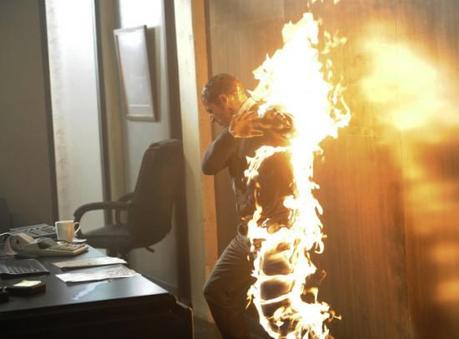Contributor: Gregg Wright
After a couple of slightly lesser episodes, “American Horror Story” appears to be back on track for the lead-up to the finale. Thankfully, there’s very little coverage of the Antichrist baby plot. The focus is on Tate, Violet, Larry, and Constance. Most of the episode isn’t much more engaging than the previous two, but a great opening and a shocking reveal in the final third do a lot to make up for the episode’s weaknesses.

The opening scene helps to fill in some of the existing gaps in the chronology. It’s 1994; seemingly not long after Larry killed Beau and had his wife burn herself and their two children to death. Constance, Tate, and Addy have all moved in with Larry in the murder house, and Tate is not happy about any of this. Despite the denials, Tate knows that Larry killed Beau, and resents Constance for being the manipulative, self-absorbed woman that she is.
As it turns out, this is the evening before the shooting. On his way to school, Tate makes a stop at Larry’s workplace and sets him on fire. That’s one mystery solved. This opening scene gives us a better understanding of Tate’s home life, but Tate’s actual motivations for conducting the shooting are still not clear. Frying Larry makes sense, but the shooting seems more like a general release of Tate’s anger and frustration over how screwed up his life has become.
The simple answer is that Tate is just mentally disturbed. But I get the sense that the house was at least partially responsible for pushing him over the edge. And previous episodes seemed to have been hinting at some deeper motivation. If this is the best answer we’re getting, then I might be a bit disappointed. (And on a related note, why did Tate call the exterminator a murderer? Was it for murdering bugs? How odd.)
Constance is an interesting character, but it feels as though she’s been a bit poorly utilized lately. I suppose it was inevitable that she would eventually fall under suspicion from law enforcement, given how much death has surrounded her. I’m just not that interested in seeing her in this type of situation, especially when Larry is just going to take the fall for the crime and end the threat for good.
To a certain extent, this is a fitting final episode for Larry, who we likely won’t be seeing again (at least not for a while). But if this really is Larry’s farewell, then I might have preferred an episode that gave him a little bit more screen time. Then again, the character may never have been important enough to warrant that kind of treatment. Larry’s original purpose in the show was seemingly to be yet another example of the house’s negative effect on its residents. I’m not sure what else could be done with Larry, now that he’s been so demystified.
I don’t know how many viewers saw it coming, but I was completely blindsided by the reveal that Violet has been dead since episode 6 (“Piggy Piggy”). Even as Violet kept trying to flee the house, only to constantly find herself running back into it, the only explanation that came to mind was that Tate was somehow responsible. There were other clues as well, like the exterminator reeling back in horror (probably not so much at Tate, but at Violet’s body) and the blowflies in the house.
The twist itself might not seem all that earth-shattering (or original) on paper, but the presentation made it extremely effective. That fight between Ben and Tate was incredibly violent, and I don’t mean that in the blood and guts kind of way. There’s really a sense that Tate might actually succeed in killing Ben. And then there’s the brilliant fake-out of Violet’s growing horror over the prospect of dying, which is probably the biggest reason I didn’t even consider the possibility that she was already dead.
I often feel like characters in dramas seem to unnaturally overreact to every problem they encounter, but I didn’t get that feeling at all here. In fact, it seems pretty rare for me to get that horrible “pit of my stomach” feeling that the trauma I’m witnessing in front of me is really happening, at least when it comes to TV shows. Probably the best example I’ve ever seen of that gut-wrenching, realistic feeling of grief and shock is the season 5 episode of “Buffy the Vampire Slayer” entitled “The Body”. In both that case, and here, exceptional acting was required to pull it off successfully.
This is James Wong’s second episode of the season, and despite some minor issues, it’s another win for him. Perhaps being tasked with such significant turning points in the show is part of why both of his episodes have been good, but he does deserve credit for his solid handling of the story material. Once again, “American Horror Story” proves that it’s one of the most unconventional and brutally effective shows on television. My expectations for the remaining two episodes of the season are high.
Rating: 8/10

